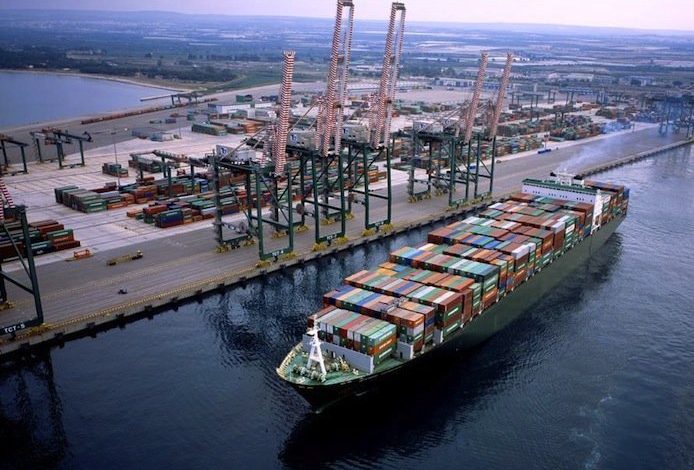How five digital experts at top logistics providers are preparing for the future

Eytan Buchman from online freight marketplace Freightos reports.
I’ve been writing about freight digitisation for years. For much of that time, a debate raged about whether the freight industry was actually embracing digitization or if it was all just hype. Last week, I realised that this has already been settled.
Here’s the proof. Search LinkedIn for “digital transformation” or “digital architect” job titles, and limit results to any top forwarder. Nearly every top forwarder has someone managing digitisation.
What awaits us in the future of freight?
Everything will be integrated
As the world grows more connected, freight does too. The first stop, according to many of the experts, is truly global sales, with technology bridging language and legal obstacles. It also means better connectivity, with IOT driving “seamless real-time network integration across the ecosystem players,” according to AllCargo’s chief digital officer Amol Patel.
But as digital transformation extends beyond internal IT systems, it will require partner and customer integration. As Troels Stovring, Twill Logistics (Damco) CEO says, “Ports will start connecting and sharing, containers will start getting tracking devices, truckers will have a standard to share real-time tracking features.”
Visibility and predictive analytics
Connectivity also drives visibility. Ubiquitous data coupled with machine learning will help forwarders tailor unique offerings for individual customers, driving what Phil Coughlin, chief strategy officer at Expeditors sees to be operational opportunities, “Opening up tremendous capacity in operational productivity, visibility and routing optimisation.” By marrying analytics with customer management, Stovring predicts enhanced customer with a powerful combination of automated handling of standard processes, data-driven exception prediction and people solely focusing on exception handling.
The road to digital
Change doesn’t happen on its own and just creating a small team to lead change isn’t always sufficient. Which means that companies need to foster environments that encourage innovation. Here are five strategies used by the interviewed digital freight experts.
1. Culture of innovation: Coming to AllCargo from PayPal, Amol Patel arranged a Silicon Valley immersion week for key employees in an attempt to encourage innovation. Given that rapid innovation will occasionally fail, others have embraced inevitable failure. At Twill Logistics, Stovring goes as far as having his team regularly select a “failure of the week”, using it as a learning experience. According to Geodis’s Martin-Neuville, “Key to managing these changes is the capacity for an organization to accept failure through a permanent trial and error process. Must win is replaced by must try.”
2. Customer obsession: Freight is a service-based industry so it’s no surprise logistics providers are leveraging technology to make life better for shippers. One expert views the future of digitalization as increasing the scope of value-added services, using a broader range of services to increase customer satisfaction. This is actually a mindset shift for an industry that Stovring says traditionally makes decides based on internal business needs, not customer needs. Instead, Twill Logistics adheres to an agile methodology that enables short bursts of customer-driven feature development, production and improvement, making rapid changes to improve the customer experience. Patel continues that vein of thought, letting customer needs dictate development, “One has to think outside in from a customer point of view to guide the objectives of the digital transformation processes.”
3. Cross-functional teams: Steve Jobs redesigned Pixar’s offices to encourage casual interactions between unrelated teams. This idea crossed the chasm from high-tech to freight, with companies leveraging multi-unit teams to prioritize the range of digitization efforts and improve ideation and garner business unit buy-in on complex rollouts. For Stovring, even cross-functional teams aren’t enough; he calls for attracting people from outside of the industry in order to think out of the box (a thought obviously echoed by AllCargo, which hired Patel from PayPal).
4. Leadership support: In a fairly traditional industry, change requires risk-taking. Which is why experts stressed that top management buy-in for changes and risk-taking is business-critical to actually push for change. For example, Damco’s strategy empowered Twill Logistics with independent decision-making capabilities, while still receiving strategic input from a venture board that includes internal senior management.
5. Computers aren’t everything: Artificial intelligence doesn’t mean freight professionals will be out of a job. Innovative companies leverage a mix of technology and deep professional expertise. For example there may be automatic exception detection handed over to people for exception management for what Stovring calls “world-class exception management.” Avoiding the desire to automate everything takes restraint, but Expeditor’s Coughlin insists that such restraint is critical.
As a wise Danish politician once said, it is difficult to make predictions, especially about the future. What makes good organizations great is the ability to observe trends and prepare for multiple eventualities, including diversification into new technologies and industries; it’s what drove Apple to enter cellphone industry and Amazon to buy a grocery store.
If there’s one clear takeaway from these insights, it’s that just hiring someone to lead transformation is not enough. Bringing freight online is a cross-organizational attempt, requiring focus, discipline and visionaries to lead the charge. Or else, as Martin-Neuville puts it: “The clock is ticking and if the industry’s ecosystem doesn’t evolve quickly, it will very soon be rendered obsolete by both new fully digitized players or digital specialists requiring far more efficient and agile solutions…creating a fully digital customer experience covering the entire price to pay process will quickly become a major differentiator.”
